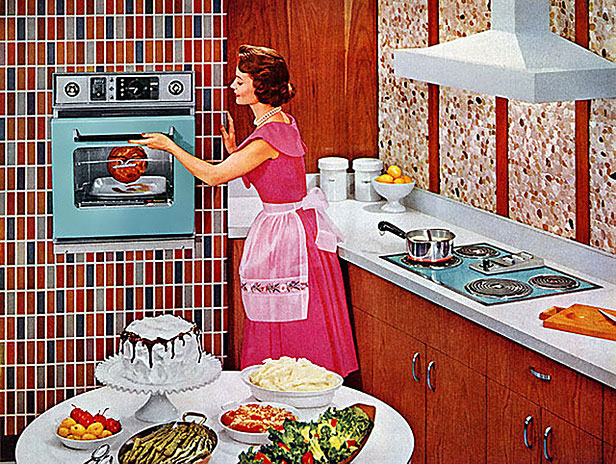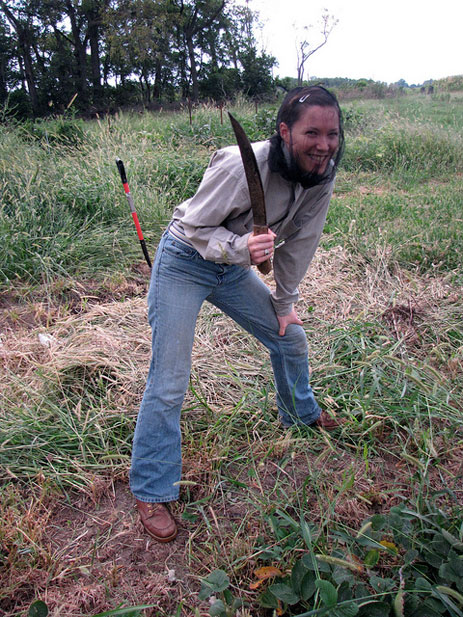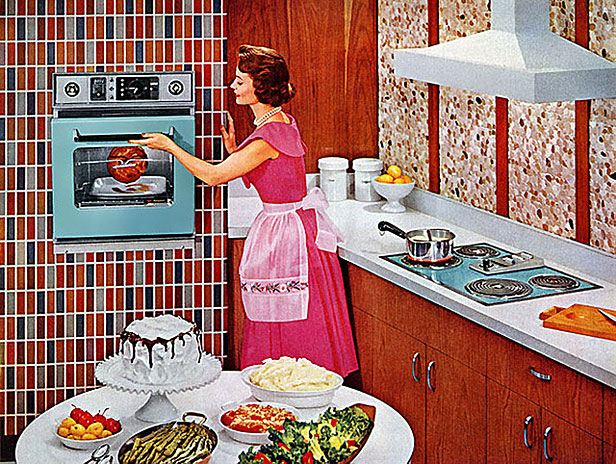 Mad women: The quintessential 1950s domestic goddess.Advertisement: James Vaughn/Flickr
Mad women: The quintessential 1950s domestic goddess.Advertisement: James Vaughn/Flickr
When my parents came to visit the farm this fall, I cooked a few simple yet (hopefully) tasty meals using some of the squash, apples, kale, and tomatoes we’d harvested. As my mom watched me pop open jars of things I canned and cut, crack, and carve my way towards a meal, she exclaimed, “Wow, you’ve become so domestic!”
My inner feminist bristled, and the comment has nagged me ever since.
 The author in her mosquito-slaying attire.It’s not that she said anything wrong — my mom grew up in the 1950s, a decade that defined domesticity. It wasn’t an ideal she strove for, and I’m sure her comment was in part wondering out loud where I learned how to be useful in the kitchen. She would be the first to admit I didn’t learn to bake a pie from her.
The author in her mosquito-slaying attire.It’s not that she said anything wrong — my mom grew up in the 1950s, a decade that defined domesticity. It wasn’t an ideal she strove for, and I’m sure her comment was in part wondering out loud where I learned how to be useful in the kitchen. She would be the first to admit I didn’t learn to bake a pie from her.
And it’s true that things I do in my life could be called “domestic.” I knit. I cook. I sew and preserve and occasionally even bake. So why am I so agitated at the thought of being good at navigating a recipe or wielding a pressure canner?
In part, I think the word “domestic” bothers me because, from an outsiders’ perspective, the difference between what I do to be as self-sufficient as possible and the social norm of what it means to be a woman don’t really look that different: A pantry full of homemade pickles triggers the same image regardless of the politics of the person who made them. It’s traditional for the woman to be the one to grow, preserve, and cook food for her family. Yet I feel about as far from “traditional” as it’s possible to be in my politics and beliefs. James Dobson and I would not be best friends — I’m proudly unmarried and cohabiting with my partner, I work outside my home, I’m not Christian, I’m childless by choice at 32 … I could go on.
It’s my nature to question and challenge social norms, not conform to them. The desire to cook from scratch and preserve what I grow comes from a fiercely thoughtful place that is motivated by a desire to be independent of an unjust economic system. It’s definitely not because society tells me that as a woman, I should be the one to put meals on the table.
While I may have taught myself a thing or two about growing and cooking food, the connotation of being “domestic” feels constrictive, one-dimensional. More like “domesticated.” It’s hardly the main focus of who I am. And the word “domestic” is sexist, as my partner, Brian, points out. There’s a particular body of work that’s considered domestic: it includes cooking, cleaning, sewing, child care — tasks traditionally associated with women. You wouldn’t call Brian “domestic” because he insulated our attic or installed our shower, even though those tasks are every bit as related to our home.
If I’m thankful for anything about the idea of domesticity and what it represents, it’s that we live in an age where I have a choice. I came to live and eat the way I do not because it was thrust upon me from birth, but because after studying and reading and pondering, I decided that this would be the most satisfying way for me to live.
So I’ll just steer clear of the “d” word and call it something else. Like maybe “self-sufficient,” or “independent.”
What about you other DIY “retrovores” out there? Do you struggle with this conundrum, too?



